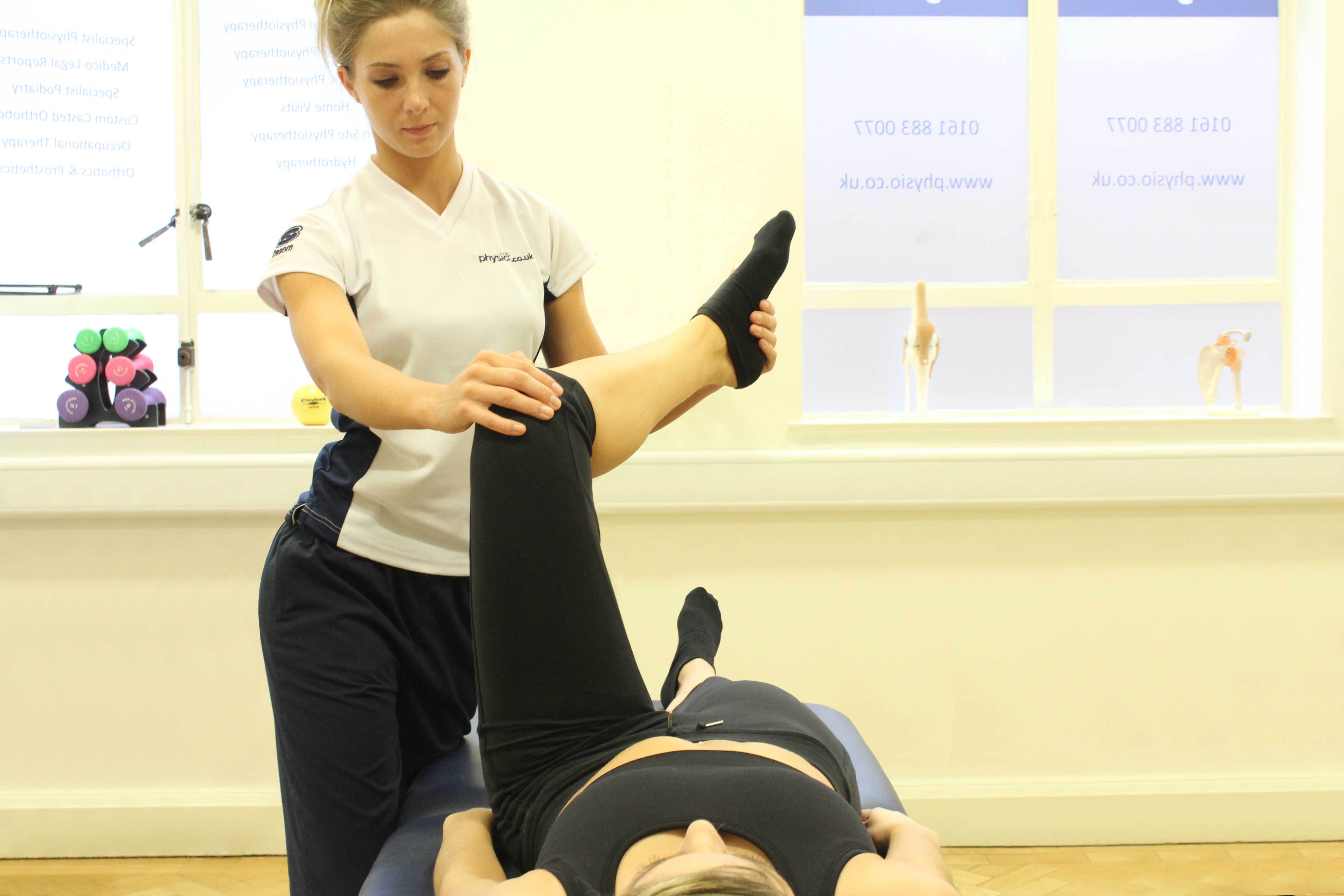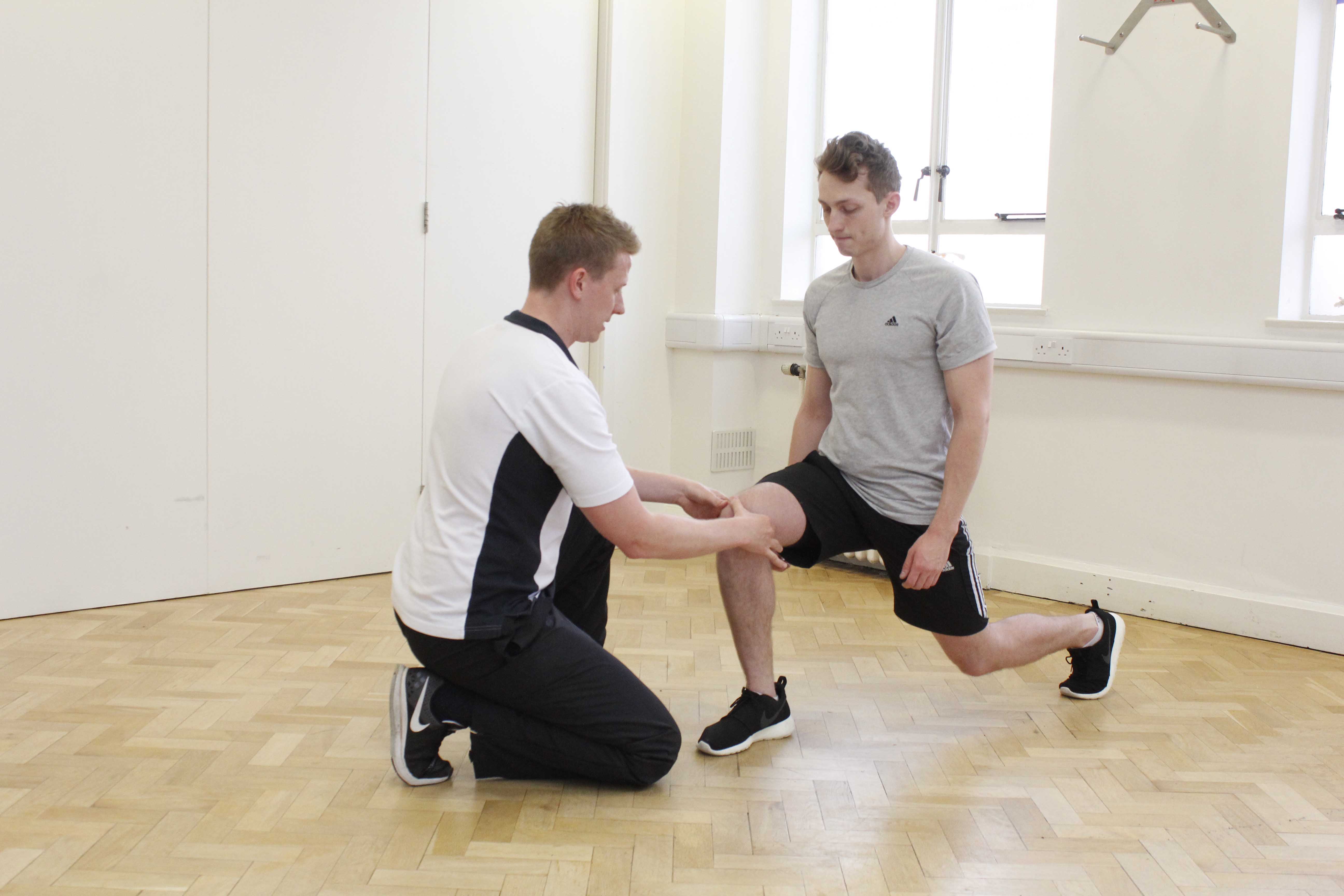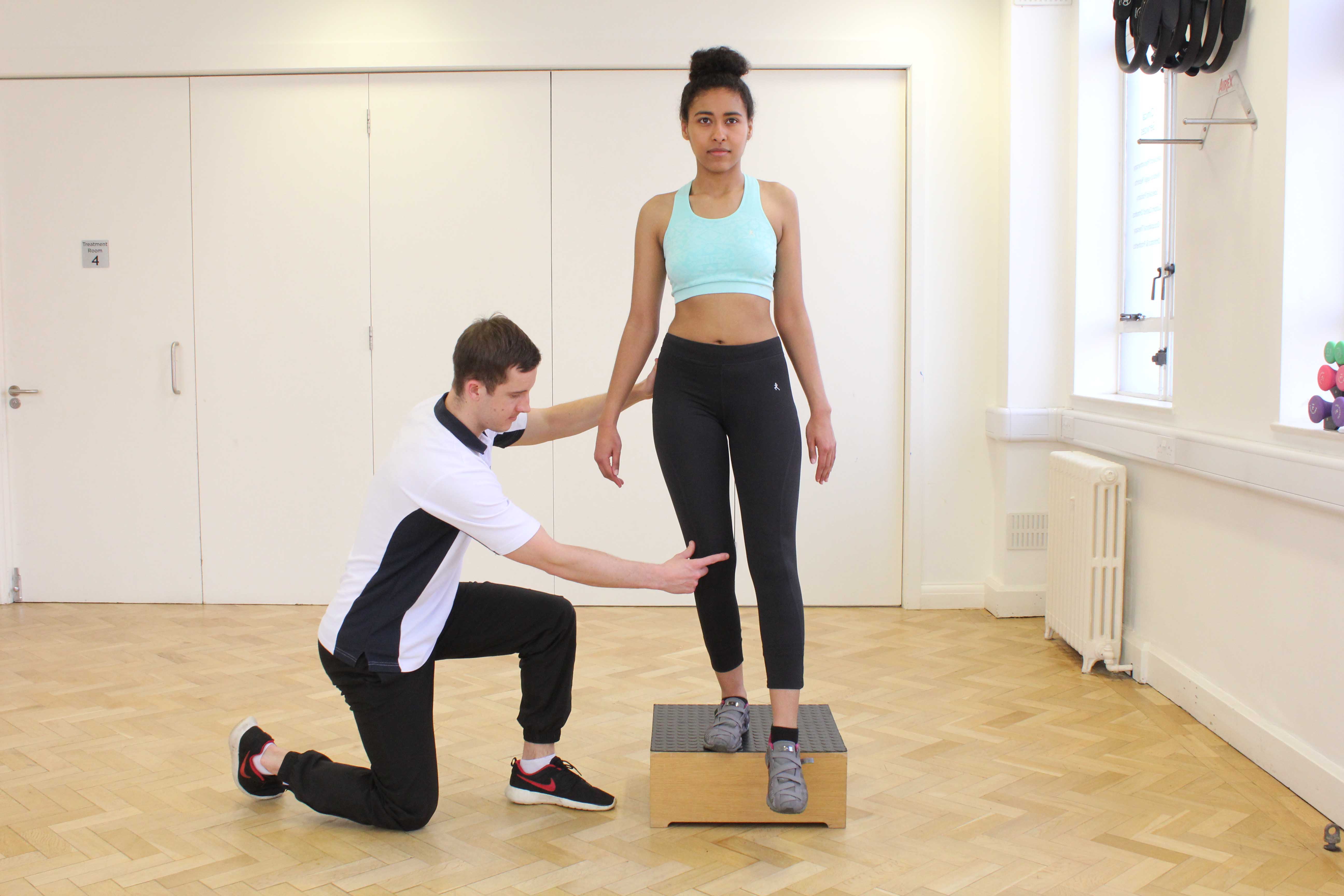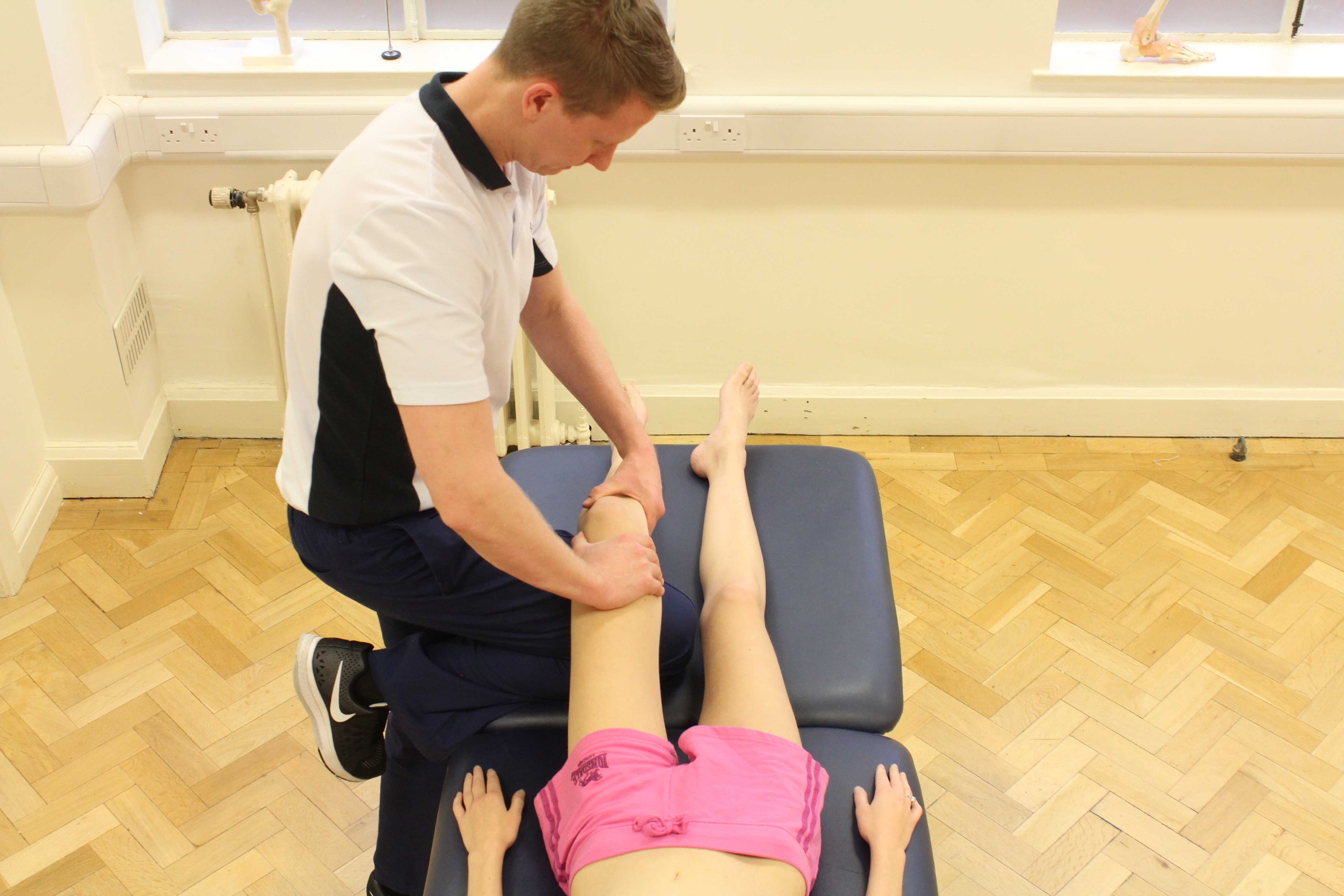Total Knee Replacement
A total knee replacement is a surgical procedure whereby the damaged bones of a diseased knee joint are replaced with an artificial joint. A knee replacement helps reduce the symptoms and improve knee function. It is also imperative to follow the total knee replacement surgery with a comprehensive and long term physiotherapy programme to ensure success of the surgery and the full or near full return of function in the knee.
 Above: Specialist MSK therapist conducting a knee assessment
Above: Specialist MSK therapist conducting a knee assessmentYour knee joint is made up of the ends of the thigh bone (femur) and shin bone (tibia). In addition, the kneecap (patella) is located at the front of the knee for protection. These ends are covered by shock absorbing cartilage which helps the bones of the joint glide over the each other smoothly and efficiently during movement. However, the cartilage can get damaged or injured for a number of reasons including osteoarthritis, trauma or other destructive diseases of the knee joint, this can make the joint painful and stiff.
A total knee replacement can alleviate symptoms such as pain, stiffness and reduced function in the knee joint. Surgery may involve a partial knee replacement or total knee replacement depending on the condition of the knee joint. A total knee replacement is more common.
In a total knee replacement, both the ends of the thigh bone (femur) and the shin bone (tibia) are replaced with artificial material and in some cases the back of the knee cap (patella) is also restored. During total knee replacement surgery, a general anaesthetic is administered, after which, the surgeon makes a cut down the front of the knee to expose the patella. The patella is then moved to the side so the surgeon can get to the knee joint behind it. The damaged ends of the femur (thigh bone) and tibia (shin bone) are then carefully cut away and shaped.
After the bones have been shaped, a hole is then drilled into the top of the shin bone (tibia) and a flat metal cap on a stem is fitted over it. A curved metal cap is also fitted onto the lower end of the thigh bone (femur). Additionally, in some cases the back of the patella is replaced with a plastic part, this is called patella resurfacing. Each replacement is then fixed using special bone cement after which a plastic spacer is placed in between the two metal replacements to act as a form of cartilage which reduces friction in the new knee joint during movement.
Finally, after successfully replacing the damaged surfaces within the knee joint with artificial parts, the wound is then closed using either stitches or clips and a dressing is applied to the wound. Additionally, a splint may be provided in the early stages to protect the knee and keep it immobile.
It is essential to undergo a total knee replacement for severe pain, stiffness and reduced function due to osteoarthritis of the knee, trauma or other degenerative disease. A successful knee replacement usually lasts 10 to 15 years. This will depend on age, success of the surgery, weight, physical activity and adherence to a physiotherapy programme.
 Above: Stability and strength training for the knee, supervised by a MSK Physiotherapist
Above: Stability and strength training for the knee, supervised by a MSK PhysiotherapistPhysiotherapy before total knee replacement
Before having your total knee replacement surgery you should undergo a personal physiotherapy programme with Physio.co.uk to help prepare you for your surgery and also help reduce the time is takes to recover after surgery. Your physiotherapy programme with Physio.co.uk prior to your surgery will focus on strengthening the muscles around your knee whilst also strengthening muscles in your hip, ankle and unaffected leg. Physiotherapy will also include the maintenance of the range of movement in your knee and ensuring that your knee is in an optimal condition to guarantee a more successful surgery.
 Above: Stability and strength training for the knee, supervised by a MSK Physiotherapist
Above: Stability and strength training for the knee, supervised by a MSK PhysiotherapistSymptoms after total knee replacement
Immediately after your total knee replacement you will experience pain, swelling and stiffness in your knee joint. You will also experience a decrease in range of movement in your knee and reduced muscle strength. You will be encouraged to keep mobile and be given elbow crutches or walking frame to aid walking for up to a week. You will be partially or full weight bearing as tolerated. Additionally you may be put on a passive motion machine to restore movement in your knee and leg. The passive motion machine will slowly move your leg when you’re in bed and helps to decrease swelling by keeping your leg raised whilst also improving circulation. You will usually be in hospital for 6 – 10 days. As soon as you can bend your knee enough without any pain you can resume driving. This may take up to 6 weeks after your total knee replacement. You will be able to return to work between 6 – 12 weeks depending on your job. Physiotherapy will begin immediately after your total knee replacement and should carry on for a prolonged period of time afterwards.
 Above: Mobilisations of the patella by experienced MSK therapist
Above: Mobilisations of the patella by experienced MSK therapistPhysiotherapy after total knee replacement
It is crucial to begin an intense physiotherapy course immediately after your total knee replacement to ensure the success of your surgery, to guarantee the return of full or near full function in your knee and to promote a longer life for the knee replacement. Physiotherapy with Physio.co.uk will also prevent the likelihood of any problems occurring after your operation. Call Physio.co.uk now on 0330 088 7800 for an immediate appointment.
Early stages (1-3 weeks)
During the early stages of your rehabilitation with Physio.co.uk, your physiotherapy programme will aim to control any pain and swelling, maintain and improve range of movement and begin strengthening the muscles in and around your knee joint. Your physiotherapy will also include strengthening exercises for your ankle hip and opposite leg to maximise support for your operated knee. Additionally, your physiotherapy will involve partial to full weight bearing exercises as tolerated. Your physiotherapy will include:
- Cryotherapy (Ice)
- Compression and elevation
- Gentle patella mobilisations
- Full weight bearing exercises as tolerated
- Passive and active range of movement exercises
- Strengthening of quadriceps and hamstrings
- Stretching of quads, hamstrings and calf muscles
- Strengthening of hip, ankle and muscles in uninjured leg
- Hydrotherapy
Middle stages (3-6 weeks)
After a month post total knee replacement, your physiotherapy programme with Physio.co.uk will aim to continue and progress activities from the previous weeks. Physiotherapy will also continue to provide methods that will control any pain and swelling you are experiencing. Furthermore, your physiotherapy programme will now focus on gait re-education, improving proprioception (balance), improving range of motion as well as continuing to increase flexibility, strength and muscle control. Your physiotherapy will include:
- Cryotherapy (Ice)
- Compression and elevation
- Patella mobilisations
- Ambulation (walking)
- Active range of movement exercises
- Strengthening of quadriceps and hamstrings
- Stretching of quads, hamstrings and calf muscles
- Strengthening of hip, ankle and muscles in uninjured leg
- Gait re-education training
- Proprioception (balance) exercises
- Static bicycle as tolerated
- Hydrotherapy
Later stages (6-12 weeks)
Your rehabilitation with Physio.co.uk will now focus on the continuation of strengthening and stretching exercises from previous weeks, full range of movement exercises, gait re-education, proprioception (balance) training. Additionally, your physiotherapy programme will now focus on improving your cardiovascular fitness whilst also including functional and hobby specific activities that are personal to you. Your physiotherapy will include:
- Patella mobilisations
- Continuation of strengthening exercises for quadriceps and hamstrings and other lower limb muscles
- Full range of movement exercises
- Stretching of quadriceps, hamstrings and calf muscles
- Proprioception training (balance)
- Gait re-education training
- Agility exercises (changing direction)
- Moderate intensity walking
- Static bicycle (resistance as tolerated)
- Hydrotherapy
- Moderate intensity swimming
3 months onwards
After three months, your physiotherapy will continue to include strengthening and stretching exercises for muscles in and around your replaced knee as well as your hip, ankle and opposite leg. You should also continue to progress your cardiovascular fitness, proprioception training, range of movement exercises and functionally specific activities. Success and rate of your rehabilitation programme with Physio.co.uk after you have undergone a total knee replacement will depend on your commitment and adherence to your physiotherapy programme.
Summary
Total knee replacement is a surgical procedure to replace the weight-bearing surfaces of the knee joint to relieve the pain and disability caused by severe knee problems such as osteoarthritis. It is essential to undergo total knee replacement to significantly relieve symptoms caused by problems within the knee joint and improve knee function. After total knee replacement, a comprehensive physiotherapy programme with Physio.co.uk is crucial to ensure the success of the surgery, prevent the likelihood of any future problems and prolong the life of the knee replacement. A physiotherapy programme with Physio.co.uk offers the return of symptom free, full or near to full function in the knee joint. Commitment to a personal physiotherapy programme with Physio.co.uk will provide you with the opportunity to get back to what it is you love doing the most as soon as it is physically possible. Call Physio.co.uk now on 0330 088 7800 for more information or to book an appointment please contact us.

 0330 088 7800
0330 088 7800


































